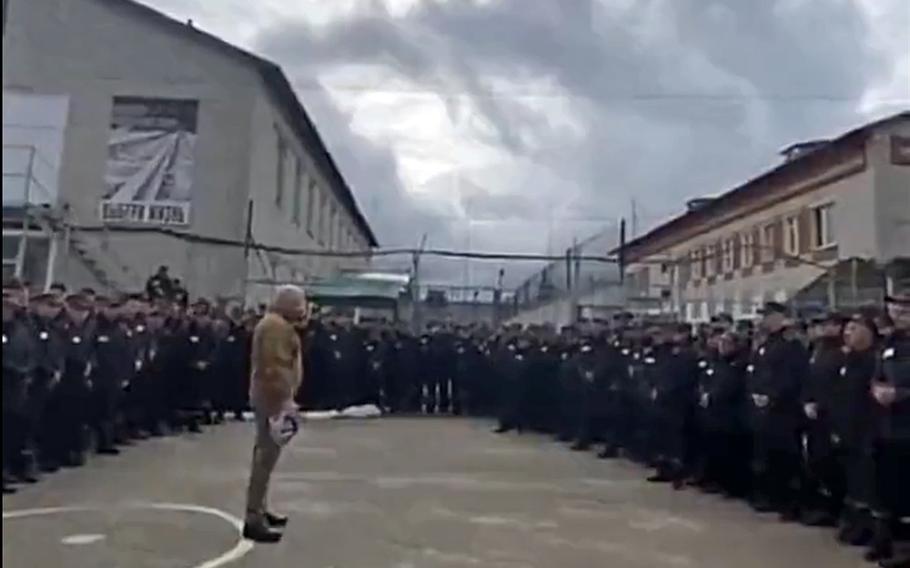Europe
Russian mercenary chief says he is also behind global information war
The Washington Post February 16, 2023

A screenshot from a video of Wagner Group leader Yevgeny Prigozhin at a Russian prison, where he was offering prisoners release if they were willing to serve six months in Ukraine. The Wagner Group has close ties to the Kremlin. (Twitter)
For years, the Internet Research Agency, a shadowy company based in St. Petersburg, has carried out Russian information warfare across the globe, employing fake social media accounts and other forms of disinformation to exploit divisions in Western society, analysts and governments say.
Nearly a year into the Russian invasion of Ukraine, the man behind the Wagner Group, the Russian mercenary outfit fighting on the front lines, has claimed to have founded the Internet Research Agency as well.
The admission by oligarch Yevgeniy Prigozhin, more an acknowledgment than a revelation, affirms his role at the center of Russia's aggressive interventions on the world stage, on the ground and online.
Prigozhin — who the U.S. government estimates has deployed some 50,000 fighters to Ukraine, many recruited from prisons — boasted in November that he was interfering in the U.S. midterm congressional elections and intended to continue doing so.
"Gentlemen, we interfered. We are interfering and we will interfere. Carefully, precisely, surgically and in our own way, as we know how to do," he told Russian media outlets a day before the elections. The claims were impossible to verify.
An ally of President Vladimir Putin, Prigozhin earned his reputation as an operator of internet "troll farms." The U.S. Treasury Department has placed him under several rounds of sanctions, accusing him of interference in the 2016 presidential election, among others, in part by funding the Internet Research Agency — which has been accused of fomenting confusion across continents, including in the run-up to "Brexit" and ahead of elections in the Philippines.
This week, he embraced and expanded on the U.S. assessment. "I was never just a financier" of the agency, read a statement posted to the account of his press service in response to questions from reporters. "I invented it, I created it, I ran it for a long time."
"It was created to protect the Russian information space from the boorish aggressive propaganda of anti-Russian assertions from the West," the statement added.
"Prigozhin is now openly admitting to what the United States has been saying since 2018," State Department spokesperson Colleen Smith said in an email. The Treasury Department did not respond to a request for comment.
When Russia first invaded Ukraine in 2014 and annexed Crimea, the Internet Research Agency was part of an effort to paint the Ukrainian government as fascists or neo-Nazis, according to a 2014 BuzzFeed News investigation. The agency wielded a budget of more than $10 million and a staff of at least 600, the investigation found.
Special counsel Robert S. Mueller III's report on Russia's role in the 2016 U.S. election singled out the company for its attempts at "sowing discord in the U.S. political system." What started as a generalized program to undermine the U.S. electoral system grew into a targeted operation that favored then-candidate Donald Trump and disparaged Hillary Clinton, Mueller wrote. The group bought political ads in the names of American individuals and entities and posed as grass-roots U.S. organizers to stage political rallies, according to the report.
By the end of 2016, accounts controlled by the company had reached millions of Americans. A Facebook representative testified that the social media company had identified 470 Internet Research Agency-controlled accounts, responsible for a collective 80,000 posts over a 2 1/2-year period and reaching an estimated 126 million people.
More recently, the company has been linked to social media accounts critical of the Biden administration's agenda. The cybersecurity research firm Recorded Future told the New York Times it had identified a new campaign to undermine the Biden administration's military assistance for Ukraine.
Social media accounts linked to the Internet Research Agency worked to stir divisions over Islam in the United Kingdom in the months leading up to the country's vote to exit the European Union, according to a 2018 report from the British think tank Demos. Philippines news site Rappler linked the company to a broader propaganda ecosystem there.
The impact of such interference is difficult to measure concretely. But for an oligarch invested in propagating an image of Russian power, the perception of meddling is an end in itself.
Thomas Rid, director of the Alperovich Institute for Cybersecurity Studies at Johns Hopkins University, said that the Internet Research Agency's tangible impact has been widely exaggerated, to a large extent because it appeared in the Mueller report. There is no definitive evidence that the group has succeeded in undermining any election, Rid said.
"We see the dismal performance of the Russian armed forces in Ukraine right now, so why are we assuming that some undisciplined, incompetently run outlet in St. Petersburg would be able to disrupt elections across the globe?" Rid said in an interview. "The whole narrative and collective conversation around disinformation is occupying such a big space that it is more impactful than the actual operation being carried out."
Any public statement by Prigozhin, who claims openly to be in the business of disinformation, should be taken with a grain of salt, Rid said.
The Washington Post's Robyn Dixon contributed to this report.